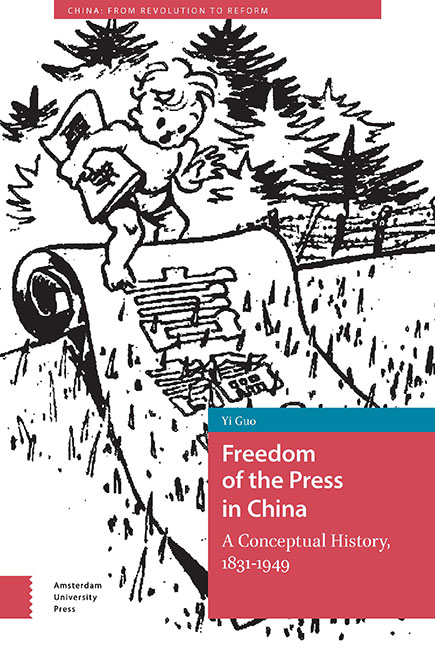Book contents
- Frontmater
- Contents
- A Note on Romanization
- Acknowledgements
- Foreword
- Introduction
- 1 The Enlightenment of the West
- 2 Chuban Ziyou: The Invention of a Neologism
- 3 The Liminal Landscape
- 4 The Intellectual Legacy of Sun Yat-sen
- 5 The Empty Phrase and Popular Ignorance
- 6 Conceptual Debates in the 1920s and 1930s
- 7 The Last Call for Press Freedom
- Conclusion
- Bibliography
- Index
2 - Chuban Ziyou: The Invention of a Neologism
Published online by Cambridge University Press: 20 November 2020
- Frontmater
- Contents
- A Note on Romanization
- Acknowledgements
- Foreword
- Introduction
- 1 The Enlightenment of the West
- 2 Chuban Ziyou: The Invention of a Neologism
- 3 The Liminal Landscape
- 4 The Intellectual Legacy of Sun Yat-sen
- 5 The Empty Phrase and Popular Ignorance
- 6 Conceptual Debates in the 1920s and 1930s
- 7 The Last Call for Press Freedom
- Conclusion
- Bibliography
- Index
Summary
Abstract
This chapter explores the knowledge transfer of the notion of ‘freedom of the press’ that occurred through cultural interactions between China and Meiji Japan at the turn of the twentieth century. Compared with the scattered ideas initially imported from the West, the Japanese origin of Chinese press freedom was more influential, and the concept became popular amongst Chinese intellectuals at that time. This chapter uncovers the influence of Meiji Japanese intellectuals on the formation of the Chinese conception of press freedom and explains linguistic issues resulting from this knowledge transfer between the two countries. It also points out the problematic origins of Chinese press freedom and key contextual particularities that affected its acceptance.
Keywords: Liang Qichao, John Mill, transnational knowledge transfer, free speech, liberalism
In modern Chinese vocabulary, the phrase chuban ziyou (出版自由) is used to denote the Western concept of ‘liberty of the press/freedom of the press’. However, both the Chinese words chuban (出版) and ziyou (自 由) were not used to denote ‘the press’ and ‘freedom/liberty’ respectively in Chinese literature before the nineteenth century. As a matter of fact, chuban was not a Chinese word, despite being constituted by the Chinese characters chu (出) and ban (版). Neither was chuban ziyou a concept or word in Chinese literature before the nineteenth century. The question is, where did the phrase come from, and why and how did it come to be used to denote the modern concept of ‘liberty of the press/freedom of the press’ in Chinese literature from the late nineteenth century? These questions are important, as they concern the academic issue of the formalization of the concept. Only when a country uses its national language to denote an imported alien concept does that concept really become fully transplanted into the importing country, more formally becoming a conceptual tool.
Despite previous scholars having failed to answer these questions, some still provide us with useful clues. Chinese scholar Zheng Kuangmin has indicated that there were two paths by which the Western concept of ‘freedom/liberty’ was imported into China.
- Type
- Chapter
- Information
- Freedom of the Press in ChinaA Conceptual History, 1831–1949, pp. 63 - 86Publisher: Amsterdam University PressPrint publication year: 2020



